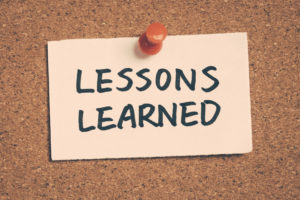Lessons Learned in Team Development – Part 5 of 5
Read Part 1, Part 2, Part 3 and Part 4 of this case study.
 The project came to a close after 19 months – a bit over schedule but within budget. There were a number of issues that did arise over that time, of course. Generally, however, Joshua, the sponsor and his team felt that the team resolved issues fairly well. In some cases, however, more adherence to processes across the team for resolving issues would have been more helpful overall.
The project came to a close after 19 months – a bit over schedule but within budget. There were a number of issues that did arise over that time, of course. Generally, however, Joshua, the sponsor and his team felt that the team resolved issues fairly well. In some cases, however, more adherence to processes across the team for resolving issues would have been more helpful overall.
Throughout the project lifecycle, Joshua, as well as the team leads, had been gathering information around lessons learned as they worked through the project. Additionally, a brief two- question survey sent to the entire project (extended) team as well as some key stakeholders produced additional data for the upcoming lessons learned team meeting.
The survey asked two simple questions:
- What went well on the project?
- What could have gone better?
Data gathered throughout the project as well as from the survey sent included:
|
What went well… |
What could have been done better… |
|
|
NOTE: The information shared in this part of the story is focused primarily on the team and how effectively they worked together/collaborated. Not included were challenges around the project scope, project changes and other more technical issues that arose on the project. Since the case study was focused on the stages of team development, the lessons learned discussed here would stay focused on the team.
The Last Team Meeting: Lessons Learned
The last team meeting, which was part of the project schedule and was the last task on the list, included the extended project team, the sponsor, key leadership stakeholders and a few of the end customers. The meeting was face-to-face primarily, but included a virtual component for those who wanted to participate but could not attend in-person.
The meeting was well attended. In part, Joshua would tell you, because it included a party to celebrate the success of the project!
The results of the survey as well as information gathered throughout the project was shared with the group prior to the meeting. At the meeting, Joshua wanted to facilitate conversation around how to share this information throughout the organization to benefit other project teams as well as to discuss how to use this information to improve overall. The group was broken into three teams: one team to determine how to best disseminate this information and two other teams to share how to use this information to improve overall.
Results from Break-Out Groups
As a result of their work, the break-out groups developed a number of recommendations for senior leadership, including:
- Utilizing a project portal that would be the starting portal for all projects undertaken within the organization. This portal would include a directory for each individual project launched regardless of its complexity as well as information on lessons learned (per category), documentation samples, past project documents, templates, tools and other information of relevance to project management teams. The portal utilized for this initiative would be the starting point.
- A framework as well as roadmap for managing various issues that arise on projects, making decisions, resolving conflicts, and assigning roles and responsibilities. While this would certainly have to be “tweaked” for various projects, it would serve as a starting point for all project team members. A Frequently Asked Questions and Solutions Center would enable team members to share solutions to problems that can be accessed by future teams, thereby reducing rework and reinventing the wheel.
- A variety of team building activities for use by project managers and project teams.
- A directory of individuals (key project resources) with particular expertise based on project work within and external to the organization
The project sponsor and a number of other key leadership team members in attendance agreed to fund an initiative to get the portal up and running as well as to develop the frameworks and roadmaps.
The team building activities, directory for key project resources and some of the other information such as documentation of projects would be added to the portal as projects were undertaken. Information would also be gathered from past projects to build up the portal. Each project moving forward would include a resource responsible for managing information to be included into the portal. This would be done for at least the next year in order to ensure the portal is built up with data that could be used for future projects.
Moving forward, each initiative launched in the organization would include:
- An initial face-to-face kick off meeting to engage the team in the project and also to enable for the start of building strong working relationships
- A final “lessons learned” meeting and project celebration
In summary…project managers who keep in mind the stages of team development enable for better, stronger, more productive teams overall. Every team, without exception, moves through the stages of development. Ensuring an understanding of the stages as well as what happens in each stage, and planning for how to move the team through the stage to achieve a high performing team, increases the overall success of the project and the commitment of the team.


